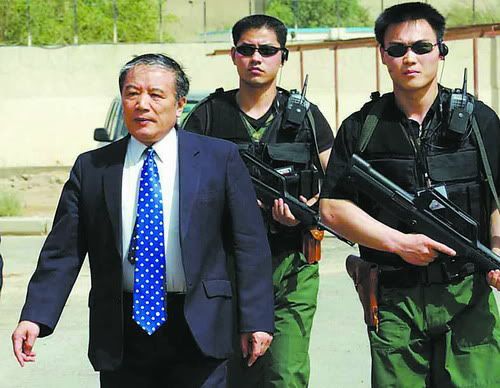This is all types of cool. Basically the PMPF and their South African mentors/trainers rescued the hostages of the MV Iceberg 1 after a two week siege. This is significant, because this rescue/siege was conducted by a private South African force who commanded an assault force they trained, with the blessing of the Puntland government. And they rescued 22 hostages who had been held for over 1000 days, after a 10 day siege. Ross Perot, eat your heart out.
What is interesting about the account below is the tactics involved and how they adapted to the changing situation. And how Rolf van Heerden’s crew was able to finally resolve the siege using some recoilless weapons, minus the weapon sights. lol
“I asked Mohamed Farole if we could get hold of larger weapons or even mortars. I also talked personally to President Farole about the situation and he raised a concern that we might kill or injure the hostages. We did manage to get hold of a Soviet 82 mm B-10 recoilless rifle and a number of rounds and it wasn’t long before we had deployed it on the beach. With no sights available the crew took aim by aligning the weapon and the ship through the open breach and we fired a number of rounds, striking the vessel around the bridge area.
“The pirates on board obviously took fright and contacted the Puntland ambassador in Dubai to inform him that they wished to surrender but that we should stop shooting at them first. We held our fire on two occasions in an effort to give them the opportunity to surrender but, after a number of breakdowns in communication, I had had enough and we resumed the bombardment of the vessel with all available weapons.
“An old United States 106 mm recoilless rifle, unearthed from the rear of a private home, was the next heavy weapon to arrive, together with six rounds provided by the Puntland government. The aiming process was repeated and after two misses the crew found the correct range and four rounds smashed into the ship with resounding explosions, setting the vessel on fire. This effectively changed the pirates’ minds and they indicated that they really wished to surrender and talk.”
If you want a good primer on Roelf, check out his book called Four Ball One Tracer. He was a commanding officer for Executive Outcomes back in the day, and currently he works under the employ of the PMPF.
Now I am not sure if he is still with Sterling Corporate Services, Bancroft Global Development, or hired directly as a member of the PMPF? There was a lot of back and forth about money and the survival of the PMPF, and it is hard to say what the arrangement is now. All though it is obvious that the men of Sterling Corporate Services are still with the force, and they are still operating.
If you remember, SCS lost one of their men in a PMPF operation last year, and that put them on the map. The UN has been trying to shut them down because they are viewed as the competition that is making the UN look bad. lol Funny how the UN could support and oppose such a force, all at the same time?
With that said, there have been several sources that have identified the effectiveness of the SCS trained and mentored PMPF force, and a reduction in piracy could be attributed to their actions.
Building up indigenous ground forces has also helped. What has really thwarted pirate networks is a ground force known as the Puntland Maritime Police Force, according to an expert who has worked on the ground in Somalia. The PMPF is about 400 men, recruited locally and trained to be a professional anti-piracy police force. And it’s worked, says former Green Beret Roger Carstens, who is working on a project about Somalia and the maritime force and has spent much time on the ground there in recent months. “They basically went in and chased the pirates to keep them out,” Carstens told Situation Report. “That kept the pirates out of the pirate towns, where they staged their attacks, and it screwed [their] investors,” he said. But he warns that if support and resources ebb for the ground force, it could falter. That would be a good thing for the pirates.
“If they fail, you could easily see a resurgence of piracy writ large,” Carstens said, emphasizing that the concentration of pirate activity emanates from Puntland, an area of northeastern Somalia that was declared an autonomous state in 1998.
The other thing that I was curious about is who is paying for the PMPF now? I imagine that the UAE is still funding it. or maybe the owners of the Iceberg paid Puntland to conduct this rescue? Who knows and if anyone is familiar with the funding and survival of the PMPF, I am all ears. Either way, good on Roelf and company and good on the PMPF for rescuing these guys. –Matt

PMPF forces conducting operations to free crew of MV Iceberg 1.
Exclusive: South African-led operation frees hostages from Somali pirates
Written by Andrew Hudson
Tuesday, 29 January 2013 This is
In December 2012 the Puntland Maritime Police Force rescued 22 sailors who had been held hostage on board the Panama-registered ship Iceberg 1 for nearly three years – the longest period for any hostages held by Somali pirates. Roelf van Heerden, the South African commander of the ground force, gives an exclusive first-hand account of the operation.
The Iceberg 1, a 4 500 tonne roll on/roll off cargo vessel owned by Dubai-based Azal Shipping, was hijacked just ten nautical miles off Aden, Yemen, on March 29, 2010. She was carrying generators, transformers and fuel tanks and had a crew of 24 from Yemen, India, Ghana, Sudan, Pakistan and the Philippines.
The Iceberg 1 eventually ran aground in September 2011 off Garacad, a small coastal village in the Galmudug region on Somalia’s eastern seaboard. With two hostages dead, a continuing standoff between the owners and the pirates, and an exhausted, sickly crew of hostages, the last months of 2012 held little prospect of an end to the ordeal. That was until the Puntland Maritime Police Force (PMPF), under the command of a team of South Africans, took action.
Roelf van Heerden, who commanded the ground forces, is permanently employed by the PMPF and his main role, together with other South Africans, is to train the PMPF and deploy the police force. Van Heerden now takes up the story:
“On 28 October 2012 Mohamed Farole, son of Puntland’s President Abdirahman Mohamed Farole, called me at the headquarters of the PMPF in Bossaso and briefed me about the Iceberg. Mohamed, who is the director of the PMPF, also asked me to carefully assess whether the PMPF could undertake an operation aimed at freeing the hostages.
“All previous attempts to resolve the hijacking, including offers of a ransom, had failed due to disagreements between the parties on the ransom amount, the means and the location of the ransom transfer. The ship’s crew were also reportedly in a sorry physical and mental state. The first fatality, a Yemeni, was said to have committed suicide in October 2010 after continuous harassment by the pirates. The other fatality amongst the hostages was the first officer, Dhiraj Kumar Tiwari, who had been severely tortured by the pirates and had not been seen since September 2011.
“The vessel had also run out of fuel and the seasonal high winds had caused both the ship’s anchors to break loose allowing the vessel to drift helplessly onto the rocks. The Iceberg’s hull had ruptured and the lower hold containing eighteen very large generators in 12-metre containers had flooded.

